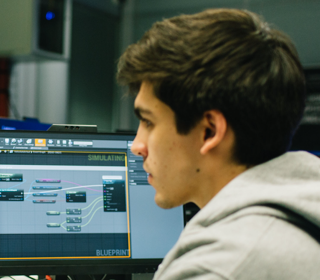
Blog

Did you know that skills related to game engines are experiencing strong growth, and over the next 10 years, demand for candidates with particular gaming skills is projected to grow by 122 per cent? Studying a degree in Game Technology at Birmingham City University will not only provide you with the knowledge and experience to work within the gaming industry, but a range of different industries too. In fact, more computer technology jobs are developing across sectors that are not dominantly about computer games.
We explore trends within the technology industry right now, and find out what type of jobs you can get out of studying a degree in Game Technology.
Real-time 3D and why it matters
Computer aided design (CAD) has made a dramatic impact on the ‘paper and pencil’ designs that have been around for hundreds of years’. Now, with the advanced technology and the skills of the computer programmers. Most 2D designs have changed to 3D models. This new design method is the future for many industries. On our BSc Game Technology degree, you will learn 3D Game Programming in your first year of study, allowing you to develop a 3D computer game using a professional game engine.
As a whole, the game engine technology industry has become increasingly advanced. With games such as Call of Duty and Elden Ring being applauded for their attention to detail and exceptional graphics. This has also advanced to visualisation professionals using game engine technology for collaboration and presentations. Because of the increasing demand within this industry, there has been a rise in career opportunities. In your final year of study on this course, you will learn how to program and implement a 3D graphics/game scene using industry standard software. Real-time 3D skills are now requested 2.4 times more often than in 2013 (Burning glass, 2020).
Contemporary game engines such as Unity or Unreal engine
There are a variety of game engines that provide a suite of tools for game development, film and television creation, training and simulation, and architectural development. They have become one of the most advanced technology inventions of the 21st century. Their flexibility, collaboration capabilities and cost-effectiveness has made it the technology of the future. Both Unity and Unreal engine has not only become a popular resource within gaming but are now being used for real-life products such as roads, buildings and vehicles. These game engines are introduced to you in your very first year on our Computer Games Technology degree, and in fact we are a member of the Unity Academic Alliance. You will undertake tasks in Unity on 2D Game Programming and throughout the years of study on other modules and you will first start to tackle Unreal engine in the 3D Game Programming module. The programming for game engines module builds on your knowledge of these game engine concepts and programming skills as well as allowing you to understand how to port source code into other operating systems besides Microsoft Windows.
Game Technology
Find out more about our course
The role of Virtual Reality
Virtual reality is the new future. Why? You are able to analyse a situation without the real-life consequences. One example is putting the fire brigade into a burning building – without actually putting them in danger. You can train new recruits, analyse situations. Another example of this is Doctors using it to see where to do the first insertion when doing surgery or the police department using it to analyse a possible hostage situation. The uses of this technology are increasing every day, which is why on the BSc Game Technology course we cover the fundamental uses of Virtual Reality and how to develop scenarios that can be applied in a variety of domain use cases. With our range of hardware covering all the latest generation VR and AR equipment you can be sure to have the platform to achieve success in Game Jams or in your Final Year Project, wherever you choose to embrace the power of VR.

Five careers you could have after studying Computer Games Technology:
Architectural visualisation specialist: You will communicate the designer’s vision by taking pencil drawings and making them into 3D models. This allows the designs to be seen in more detail, resulting in faults and changes being more likely to get noticed. With production needing to be completed at a much quicker pace in modern industry, companies have less time to deal with faults and so reducing the number of faults in pre-production allows production to run more smoothly. For example, we have had three recent graduates take up roles with Jaguar Land Rover as Visualisation Engineers for their automotive manufacturing pipeline.
Simulation specialist: You will develop worlds for virtual testing for industries such as Aerospace, Medical, or even the Army. Using interactive 3D visualisations, you will be able to show real-life situations that in reality is not possible.
Automotive and Aerospace: Create imagery using 3D CAD data for both interiors and exteriors of vehicles. This also involves working closely with the designers (pre-production) and the engineers (production) to coordinate this data. Working within this industry allows you to work for companies such as Mercedes, Tesla and NASA.
Technical animator: Create rigs and rigging systems for characters, creatures and mechanical objects used in movies and TV shows. This role also involves high-skill problem solving. Many of the modules on our Game Technology course adopt a problem-based learning strategy, which provides you with excellent experience that will be very beneficial as you move into industry.
Experiential designer: This job role involves creating immersive experiences that blend technology and physical spaces. This is a vastly growing industry as museums, retail stores and concert halls can be accurately planned before any production begins.
Fascinated by the technology behind computer games? Well whether you want to work within the gaming industry or you want to take your skills into another exciting role, our BSc Game Technology course will provide you with the assets to begin your exciting career journey.